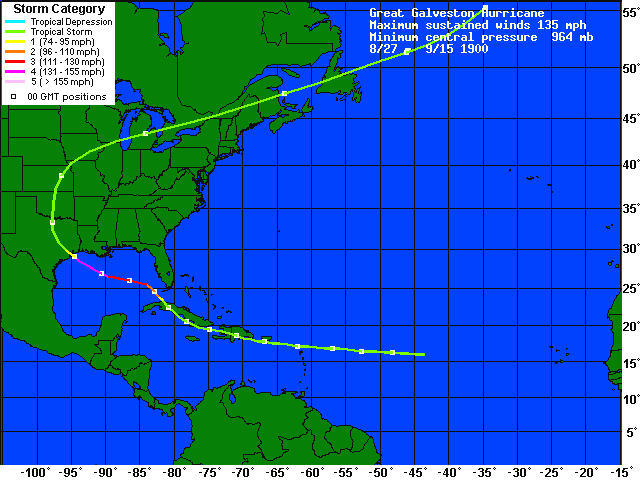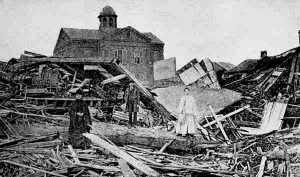

Moderator: S2k Moderators

senorpepr wrote:Scorpion wrote:Not anymore.
True, but remember that the folks in Galveston didn't have any sensible forewarning about the hurricane. They didn't have satellites or aircraft monitoring it, unlike with Katrina.


Astro_man92 wrote:uhh that doesn't make any sense
thousands died without warning right
here Thousands died with warning i'd say that is would have been ALOT worse if it had happened without warning(death toll in the millions possibly)



wxmann_91 wrote:Any hurricane that hits a populated area today could still kill thousands, inevitably there will be some people who won't leave.
The U.S. should consider themselves VERY lucky. Many major cities have the potential to be under the gun for a major disaster, San Fran, Los Angeles, and Seattle - Quakes. Midwestern cities such as Kansas City, Oklahoma City, Dallas - Tornadoes. And of course coastal cities have hurricanes. The U.S. probably gets the most natural disasters in the world, and in the future luck will probably run out, and a big city will be hit by a major catastrophe. Such an event has the potential to kill tens of thousands, if not more.
senorpepr wrote:Astro_man92 wrote:uhh that doesn't make any sense
thousands died without warning right
here Thousands died with warning i'd say that is would have been ALOT worse if it had happened without warning(death toll in the millions possibly)
Well, I don't really want to go down the road of reasons on why some of the people died in Katrina. Although the fact of the matter isn't about Katrina's residents having warning or not. They did. You can have all the hypotheticals you want, but they did have warning. As for 01L in 1900, they didn't have much warning.
Now, with that said, most of those who died in Katrina choose to stay in the area. Whether it was because of pride or funding situations, whatever, they chose to stay in the area. I'm sorry, but most did have a chance to get out. It's a matter of self-responsibility. They knew, or did not care, of the threat and choose to ride out the storm. The exception were those who faced a disability. However, to say those who were in poverty "could not" get out... I don't agree with. If they could think on their own and could physcially move, they had the chance to get out but choose not to. It's all a matter of self-responsibility. When life is on the line and you have the ability to manage it... then obviously you have the responsibility to manage it.
Therefore, in my opinion, I still put the Galveston hurricane as a much more tragic event than Katrina, in terms of lives lost and how they were lost. Those in Galveston were caught off-guard. The only folks in Louisiana and Mississippi who were caught off-guard were those who had disabilities (whether that is age, mental state, physcial state, hopsitalization, etc)
Now, let me make a disclaimer before everyone starts flying their freak flag at me. Don't get me wrong, I feel Katrina was a very tragic event. The impact of this system will be felt around the country to some point for a very long time. I'm not trying to discount Katrina nor as I dismissing those who lost lives/property in that region. All I'm saying in this post is that I feel that those who were surprised by the Galveston Hurricane is much higher than those who were surprised by Katrina, because most of the Katrina-victims choose to stay, but had access to the information of her arrival.
See, those in Galveston didn't have a satellite. They had a few ship reports, but technology to transmit those observations weren't all that wonderful back in 1900. Read Issac's Storm. Issac Cline, meteorologist at Galveston's Weather Bureau, had little information to work with. The citizen's of Galveston had even less. Whereas the folks of Louisiana/Mississippi had information available to them. They had internet, TV, radio, newspapers. Even if they didn't have them at their own houses/apartments/cardboard box, etc., this information is posted around town. They even had word of mouth from other people.
Okay... I'll stop now. [/soapbox]

JPmia wrote:I imagine there were a great deal of people who did not have cars...what did you expect them to do walk out of the city across the bridges, hitch a ride from a stranger? It appears a lot of these people went to the Superdome...well we know what happened there. Too bad they did have an organized bus/train evac. method in place.

senorpepr wrote:wxmann_91 wrote:Any hurricane that hits a populated area today could still kill thousands, inevitably there will be some people who won't leave.
The U.S. should consider themselves VERY lucky. Many major cities have the potential to be under the gun for a major disaster, San Fran, Los Angeles, and Seattle - Quakes. Midwestern cities such as Kansas City, Oklahoma City, Dallas - Tornadoes. And of course coastal cities have hurricanes. The U.S. probably gets the most natural disasters in the world, and in the future luck will probably run out, and a big city will be hit by a major catastrophe. Such an event has the potential to kill tens of thousands, if not more.
You bring up a point that I want to comment on: tornadoes and major cities. I've spent a great deal of my live in the plains. I grew up in Kansas City. Today, I work in Omaha. Many times have massive F4 or F5 tornadoes have developed within a hundred miles of a major city.
Last summer, for instance, a very large F4 struck Hallim, NE. This was just about an hour SW of Omaha. I lived not too far from this tornado, so I have the chance to drive down to Hallim (a small town) and help with the clean up efforts. I've also seen the aftermath of the F4 tornado that struck Stockton, MO on May 4, 2003. Stockton was a town I've spent many summers in during vacations. The aftermath of these F4 tornadoes left me without words.
Granted, hurricanes are much larger, but ponder this: an F3 or greater tornado will always affect land. (Unless that's one REALLY strong waterspout). Chances are it will only affect crops or some land, such as a hurricane being a "fish." However, these monster tornadoes can reach several miles in width. That's just enough to wipe major residential regions off the map. Furthermore, these tornadoes have winds much higher than a hurricane can even dream about. Doppler radar indicated that the Moore, OK tornado had winds of 318 mph. That makes the winds associated with Katrina seem pathetic.
Also consider this: Katrina struck on Monday. The NHC had New Orleans "under the gun" on Friday night. That's a sizable amount of lead time. You don't have that "lead time" with a tornado. At best, you have several minutes. Good luck to you if you happen to be asleep or taking a quick nap. Conditions here in the plains can happen in a flash and before you know it... you're out of luck.
Now, my objective here isn't to compare Katrina to a tornado. My objective here is education. Obviously we can see there was a lack in that during Katrina. We, as a public, had the luxury to have such an awesome forecast by the NHC. My hat goes off to those forecasters and to those men and women who were providing recon. Had it not been for those recon missions, data would not have populated into the models, thus limiting the lead time and increasing the error in the forecast track.
My purpose in this post is to stress getting a plan together. A hurricane plan, a tornado plan, a mudslide plan, an earthquake plan, a winter storm plan... it doesn't matter. It needs to happen. Also, access to this data. Yes, we have the internet nowadays, however, a NOAA weather radio is such a life-saver. I can personally say that those radios are a wonderful thing when they wake you up and warn you about a severe thunderstorm or a tornado. I can't even begin to count the number of times the radio has woke me up to alert me to severe weather.

Users browsing this forum: No registered users and 145 guests